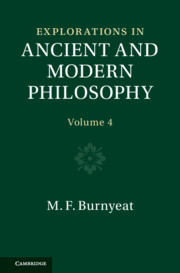Book contents
- Explorations in Ancient and Modern Philosophy
- Explorations in Ancient and Modern Philosophy
- Copyright page
- Contents
- Illustrations
- Preface
- Acknowledgements
- Abbreviations
- Introduction
- Part I Ontology and epistemology
- Chapter 1a Apology 30b2–4: Socrates, money, and the grammar of γίγνεσθαι
- Chapter 1b On the source of Burnet’s construal of Apology 30b2–4: a correction
- Chapter 2 Plato on how not to speak of what is not: Euthydemus 283a–288a
- Chapter 3 Platonism in the Bible: Numenius of Apamea on Exodus and eternity
- Chapter 4 Kinēsis vs. energeia: a much-read passage in (but not of) Aristotle’s Metaphysics
- Chapter 5 De Anima ii.5
- Chapter 6 Aquinas on ‘spiritual change’ in perception
- Chapter 7 Epistēmē
- Part II Physics and optics
- Bibliography
- Index locorum
- References
Chapter 4 - Kinēsis vs. energeia: a much-read passage in (but not of) Aristotle’s Metaphysics
from Part I - Ontology and epistemology
Published online by Cambridge University Press: 24 March 2022
- Explorations in Ancient and Modern Philosophy
- Explorations in Ancient and Modern Philosophy
- Copyright page
- Contents
- Illustrations
- Preface
- Acknowledgements
- Abbreviations
- Introduction
- Part I Ontology and epistemology
- Chapter 1a Apology 30b2–4: Socrates, money, and the grammar of γίγνεσθαι
- Chapter 1b On the source of Burnet’s construal of Apology 30b2–4: a correction
- Chapter 2 Plato on how not to speak of what is not: Euthydemus 283a–288a
- Chapter 3 Platonism in the Bible: Numenius of Apamea on Exodus and eternity
- Chapter 4 Kinēsis vs. energeia: a much-read passage in (but not of) Aristotle’s Metaphysics
- Chapter 5 De Anima ii.5
- Chapter 6 Aquinas on ‘spiritual change’ in perception
- Chapter 7 Epistēmē
- Part II Physics and optics
- Bibliography
- Index locorum
- References
Summary
A passage at 1048b18–35 in chapter six of Metaphysics Book Θ, forging a distinction between activities Aristotle classes as energeia, actuality, and those he calls kinesis, change, has become a favourite subject of discussion by analytic philosophers. This chapter argues that this now celebrated section does not fit into the overall programme of Θ, was not written for Θ, and should not be printed in the place we read it today. It is an isolated fragment of uncertain origin. Although there is good reason to accept that it is authentic Aristotle, its focus is rather different from what it is usually taken to be. Moreover, the distinction is unique in the corpus, and should not be imported into other Aristotelian contexts such as Nicomachean Ethics X or De Anima II.5. The chapter first documents the passage’s anomalous standing within the manuscript tradition. It then argues that Aristotle’s focus here is on verbal aspect, not tense. Next corruptions in the transmitted text are discussed, in light of the hypothesis that the passage was originally imported as a marginal annotation, and a revised text is proposed. Finally, the uniqueness of its philosophical content is established. It is a freak performance.
Information
- Type
- Chapter
- Information
- Explorations in Ancient and Modern Philosophy , pp. 93 - 154Publisher: Cambridge University PressPrint publication year: 2022
